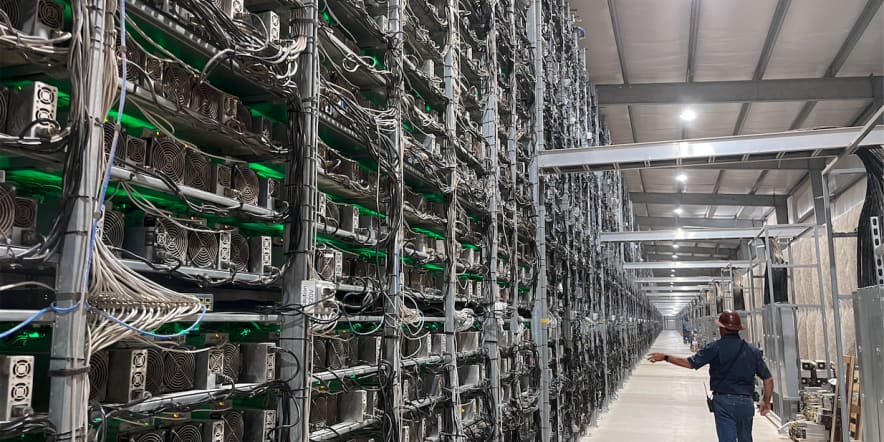Crypto Miners Shift Focus from Bitcoin to AI Data Hosting in Search of Profitability
Crypto Miners Shift Focus from Bitcoin to AI Data Hosting in Search of Profitability
By
Leah Rosenfeld
Last updated:
September 23, 2025
First Published:
December 2, 2025

Photo: CNBC Africa
The cryptocurrency mining landscape is undergoing a significant transformation. Traditionally, miners focused on Bitcoin and other proof-of-work cryptocurrencies. However, with rising energy costs and fluctuating crypto prices, many miners are exploring alternative revenue streams. One emerging trend is using mining infrastructure to host and process artificial intelligence data.
From Proof-of-Work to Data Work
AI data hosting requires large-scale computational power, similar to what is used in cryptocurrency mining. Miners are repurposing their hardware to support AI training, processing massive datasets efficiently. This approach allows them to generate income without relying solely on crypto rewards, creating a more diversified business model for mining operations.
Economic Pressures Driving Change
Bitcoin mining profitability has become increasingly sensitive to energy costs and network difficulty. Many smaller miners struggle to maintain operations during market downturns. AI data hosting presents a lucrative alternative, offering predictable revenue streams that are less volatile than cryptocurrency prices, helping miners sustain their businesses in uncertain markets.
Infrastructure Synergies
Mining farms already possess specialized hardware such as GPUs and high-performance cooling systems, which are ideal for AI workloads. By shifting focus to AI data hosting, miners can maximize the utilization of existing infrastructure. This synergy reduces operational waste and increases overall efficiency, creating a new model for tech-driven enterprises.
Supporting AI Development
The demand for AI services is growing rapidly across industries. From natural language processing to image recognition, AI applications require enormous computing resources. By offering hosting solutions, former crypto miners contribute to the broader AI ecosystem, enabling startups and researchers to access computing power they might not afford independently.
Environmental Considerations
Energy consumption has been a contentious issue in crypto mining. Hosting AI workloads may allow miners to optimize energy usage by scheduling tasks during off-peak hours or integrating renewable energy sources. This approach not only reduces costs but also aligns with global sustainability efforts, making the sector more environmentally responsible.
New Revenue Models
Miners engaging in AI hosting can generate income through multiple channels. Companies pay for processing AI tasks, subscription models, or cloud-based access to computing power. This diversification reduces dependence on volatile cryptocurrency markets and introduces a more stable financial foundation for mining operations.
Industry Collaboration
Tech companies are increasingly collaborating with mining farms to access GPU power for AI projects. These partnerships are creating new business ecosystems where miners, developers, and AI startups work together. The collaboration fosters innovation while simultaneously transforming traditional crypto mining practices into multi-faceted technology services.
Risk Management in Transition
While the shift offers opportunities, miners must navigate risks such as hardware compatibility, cybersecurity threats, and regulatory scrutiny. Adapting mining infrastructure for AI workloads requires technical expertise and strategic planning. Those who succeed in managing these risks position themselves at the intersection of two rapidly evolving industries.
The Future of Mining Operations
The convergence of crypto mining and AI hosting marks a pivotal moment for the industry. Miners are no longer limited to generating blockchain rewards but can diversify into the booming AI sector. This trend may redefine what it means to be a miner, creating hybrid operations that blend blockchain technology with artificial intelligence innovation.
Popular articles
Subscribe to unlock premium content
Disney’s Timeless Magic and How the Entertainment Giant Continues to Shape Culture and Innovation

Imran Khan’s Economic Missteps Amid Political Chaos in Pakistan

The Philippines’ Digital Shift How Remittances and BPO Are Fueling Growth

Disney’s Timeless Magic and How the Entertainment Giant Continues to Shape Culture and Innovation

Imran Khan’s Economic Missteps Amid Political Chaos in Pakistan

Disney’s Timeless Magic and How the Entertainment Giant Continues to Shape Culture and Innovation









